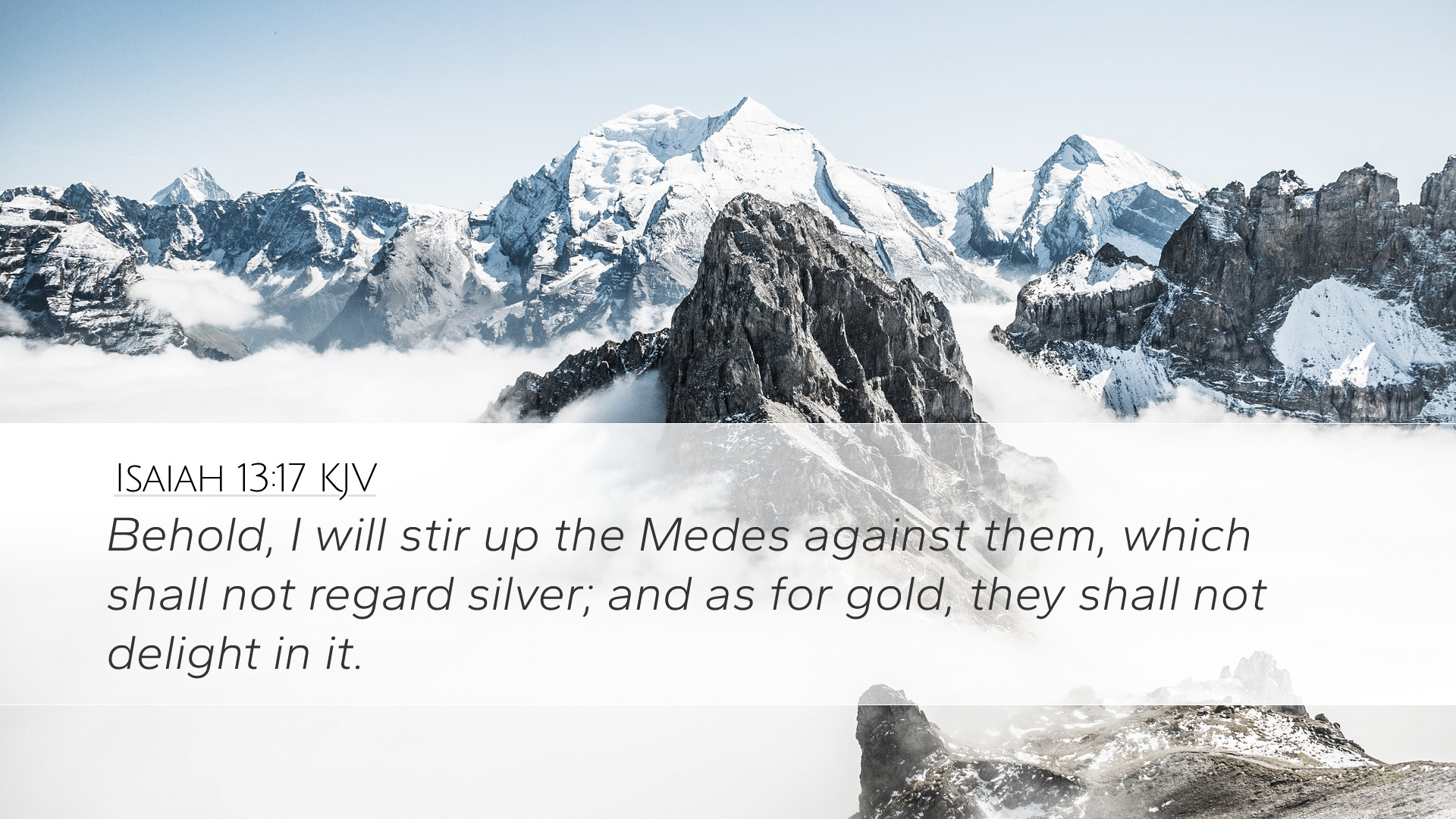Isaiah 13:17 Commentary
Verse: "Behold, I will stir up the Medes against them, which shall not regard silver; and as for gold, they shall not delight in it."
Introduction
The prophecy of Isaiah concerning Babylon is a significant portion of the book. In this verse, Isaiah foretells the rise of the Medes against Babylon, emphasizing the ruthless nature of this impending conflict. This commentary draws together insights from various public domain sources, exploring the historical, theological, and practical implications of this verse.
Historical Context
The Medes, a group from the ancient Iranian plateau, played a crucial role in the demise of the Babylonian Empire. Scholars such as Matthew Henry note that Babylon's excesses and arrogance had reached a peak, attracting divine judgment through nations like the Medes who were characterized by their fierce militarism.
- Historical Rise of the Medes: The alliance between the Medes and Persians is well documented in secular history, and their joint forces would ultimately conquer Babylon in 539 BC.
- Divine Instrument: The prophecy indicates the Medes are acting as instruments of divine judgment, signifying God’s sovereignty over nations.
Theological Implications
Isaiah's message carries potent theological themes that resonate throughout Scripture. Albert Barnes emphasizes that this verse reflects God's control over the affairs of nations and serves as a reminder of God's holiness and justice. The imagery of Medes not being swayed by silver or gold speaks to their singular commitment and God’s judgment against Babylon.
- Divine Judgment: Echoes the theme of justice. Babylon, known for its opulence, was blind to its impending destruction, much like humanity’s blindness to sin.
- God's Sovereignty: The verse affirms that God successfully utilizes nations to accomplish His purposes. This reinforces the idea that no nation is beyond His control.
Moral and Ethical Considerations
In the lens of moral theology, Adam Clarke notes the ethical considerations concerning greed and reliance on wealth. The Medes' indifference to riches illustrates the futility of wealth against divine purposes.
- Consequences of Wealth: Wealth can blind nations, leading them to pride and moral decay.
- Spiritual Vigilance: The lesson for the contemporary reader is a caution against valuing materialism over spiritual integrity.
Application for Today
This verse invites pastors, students, theologians, and scholars to reflect on their reliance upon God versus worldly wealth and power. The indifference of the Medes is a stark reminder that they were driven by a cause greater than material gain.
- Commitment to Justice: We are called to advocate for justice in our societies, understanding that God's righteous decrees will ultimately prevail.
- Trusting God's Plan: During turbulent times, believers are encouraged to trust in God’s sovereignty, knowing that He is aware of all injustices.
- Reject Materialism: The text challenges believers to evaluate their priorities, considering if their lives are shaped more by the pursuit of wealth than by faithfulness to God’s calling.
Conclusion
Isaiah 13:17 serves as a profound reminder of God’s sovereign hand in the rise and fall of nations. Its implications stretch beyond historical narrative into the realm of spiritual and ethical reflections for believers today. As we engage with this text, may we engage earnestly with the themes of justice, reliance upon God, and the dangers of materialism in our lives.


